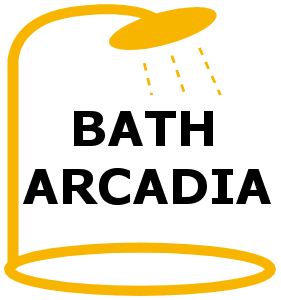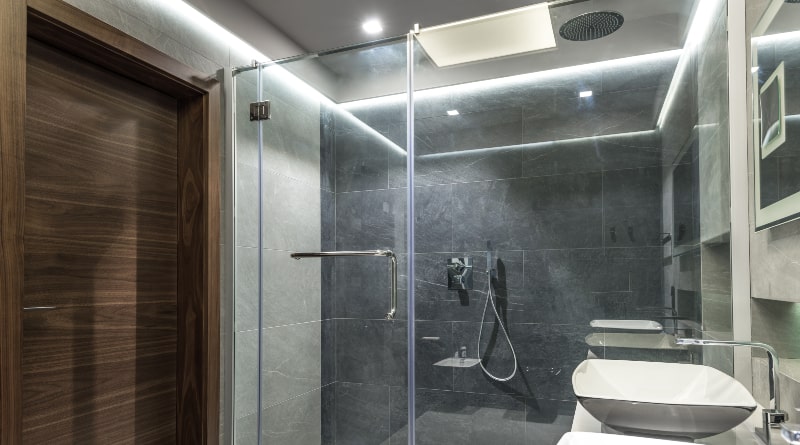This post contains affiliate links, meaning I may earn a commission at no extra cost to you if you make a purchase. As an Amazon Associate, I earn from qualifying purchases
Hard water stains on shower doors can be frustrating and unsightly, detracting from the appearance of your bathroom and even shortening the lifespan of your shower doors.
The minerals in hard water can leave unsightly stains and build up on shower doors over time, making them harder to clean and more prone to damage.
In this guide, we will explore the science behind hard water stains, identify methods for preventing and removing these stains, and provide tips for maintaining the effectiveness of prevention methods over time.
Following the steps outlined in this guide, you can keep your shower doors looking clean and clear and extend their lifespan for years.
If you’ve ever experienced the frustration of hard water stains on your shower doors, you know how challenging they can be to remove.
But with the right prevention methods and cleaning techniques, you can keep your shower doors looking as good as new.
Let’s dive in and explore how to prevent hard water stains on shower doors.
Understanding Hard Water Stains
To prevent hard water stains on shower doors, it’s essential first to understand what causes them and how to identify them.
Hard water contains highly dissolved minerals, such as calcium and magnesium.
When this water is left to dry on surfaces such as shower doors, the minerals can leave behind unsightly stains and buildup.
To identify hard water stains on your shower doors, look for white or cloudy spots or streaks on the glass.
These stains can be difficult to remove with standard cleaning products and may require specific prevention and removal methods.
It’s important to note that hard water stains are different from soap scum buildup, which is caused by the accumulation of soap residue and oils on shower surfaces.
While both hard water stains and soap scum can be unsightly, they require different prevention and removal methods.
Now that you know how to identify hard water stains on your shower doors, let’s explore some prevention methods to keep them from forming in the first place.
Prevention Methods
Preventing hard water stains on shower doors can be accomplished through various methods, each with benefits and drawbacks.
Let’s take a look at some of the most common prevention methods:
1. Water softeners
Water softeners remove minerals from hard water, preventing stains and buildup on shower doors and other surfaces.
These systems can be installed at the point of entry for your home’s water supply or as individual systems for specific fixtures such as showerheads.
While water softeners can be effective, they can also be expensive and require ongoing maintenance and replacement of filters or resins.
2. Mineral buildup removers
These products are designed to dissolve and remove mineral buildup from shower surfaces, including shower doors.
They are typically applied directly to the affected areas and left to sit for a certain period before being rinsed.
While mineral buildup removers can be effective, they can also be harsh and potentially damaging to surfaces if not used correctly.
3. Vinegar or lemon juice
These natural remedies can remove and prevent hard water stains on shower doors.
Mix equal parts vinegar or lemon juice and water in a spray bottle, apply to the affected areas, and let sit for several minutes before wiping away with a soft cloth.
While vinegar and lemon juice are effective and affordable, they may not be as strong as other prevention methods and require more frequent applications.
Regardless of which prevention method you choose, it’s important to maintain the effectiveness of these methods over time.
This can be achieved through regular maintenance and replacement of filters or resins and proper cleaning techniques.
Common Misconceptions about Preventing Hard Water Stains
Several misconceptions surround the prevention of hard water stains on shower doors.
Let’s explore some of these myths and learn the truth about preventing these unsightly stains.
Myth #1: Vinegar is a cure-all for hard water stains.
While vinegar is a popular DIY solution for removing hard water stains, it’s not always effective.
Vinegar can be acidic and can etch glass over time. Additionally, vinegar may not be strong enough to remove tough stains.
Myth #2: Using soap scum removers will prevent hard water stains.
Soap scum buildup and hard water stains are two different problems.
While soap scum removers may help prevent soap scum buildup, they may not be effective at preventing hard water stains.
Myth #3: Once you install a water softener, you’ll never have to worry about hard water stains again.
While water softeners can effectively prevent hard water stains, they are not a cure-all.
Over time, the effectiveness of a water softener can diminish, and the device may need to be serviced or replaced.
Tips for Maintaining the Effectiveness of Prevention Methods
No matter which prevention method you choose, there are a few things you can do to maintain its effectiveness:
1. Follow the Manufacturer’s Instructions Carefully
Whether using a water softener or a mineral buildup remover, it’s important to read and follow the manufacturer’s instructions carefully.
Using these products improperly can damage your shower doors or cause other problems.
2. Test New Products in a Small Area First
Before using a new product on your entire shower door, it’s a good idea to test it on a small, inconspicuous area first.
This can help you avoid any potential damage or problems.
3. Clean Your Shower Doors Regularly
Even if you’re using a prevention method, cleaning your shower doors regularly is important.
This can help remove any mineral buildup or other stains that may have formed.
Product Reviews
Various products on the market are designed to prevent hard water stains on shower doors.
Let’s take a look at some of the most popular options:
- Salt-based water softeners: These systems use salt to remove minerals from hard water, preventing stains and buildup on shower doors and other surfaces. Salt-based water softeners are effective but require ongoing maintenance and replacement of salt.
- Salt-free water softeners: These systems use a template-assisted crystallization process to convert minerals in hard water into inactive microscopic crystals. Salt-free water softeners are more environmentally friendly and require less maintenance than salt-based systems.
- Mineral buildup removers: There are many mineral buildup removers on the market, including sprays, foams, and powders. These products typically contain acids that dissolve and remove mineral buildup from shower surfaces. Choosing a product safe for your type of shower door material is important.
- Glass sealants: These products are designed to create a protective barrier on shower doors, preventing hard water stains and other buildups. Glass sealants are easy to apply and can be effective for up to six months.
When considering which product to use, weighing each option’s long-term costs and benefits is important.
Some products may be more expensive initially but require less maintenance over time, while others may be more affordable but require more frequent applications.
Also, choosing a safe product for your type of shower door material is important.
DIY Solutions
In addition to commercial products, several DIY solutions can effectively prevent and remove hard water stains on shower doors.
Let’s take a look at some of the most popular options:
- Vinegar: As mentioned earlier, vinegar can remove and prevent hard water stains on shower doors. Mix equal parts vinegar and water in a spray bottle, apply to the affected areas, and let sit for several minutes before wiping away with a soft cloth.
- Lemon juice: Like vinegar, lemon juice can be used to remove and prevent hard water stains on shower doors. Mix equal parts lemon juice and water in a spray bottle, apply to the affected areas, and let sit for several minutes before wiping away with a soft cloth.
- Baking soda: Baking soda can create a paste that removes hard water stains on shower doors. Mix baking soda and water to create a paste, apply to the affected areas, and let sit for several minutes before wiping it away with a soft cloth.
While DIY solutions can be effective and affordable, caution is important when using acidic substances on certain shower door materials.
DIY solutions may not be as strong as commercial products and require more frequent applications.
Conclusion
Preventing hard water stains on shower doors is essential to maintain appearance and longevity.
Prevention methods and regular maintenance and cleaning are the best way to prevent hard water stains on shower doors.
It’s essential to identify the type of water in your area and choose the appropriate prevention method.
DIY solutions can be effective, but store-bought products may provide more reliable and long-lasting results.
Regular cleaning with the appropriate glass cleaner can also prevent hard water stains from forming.
We cannot overemphasize the importance of preventing hard water stains on shower doors. It not only helps maintain their appearance but also extends their lifespan.
We hope this guide has been helpful, and we encourage readers to share their tips and experiences in the comments section below.



